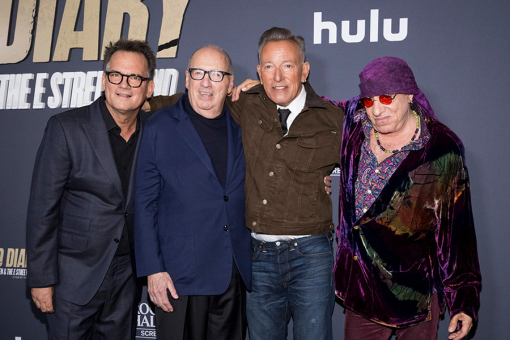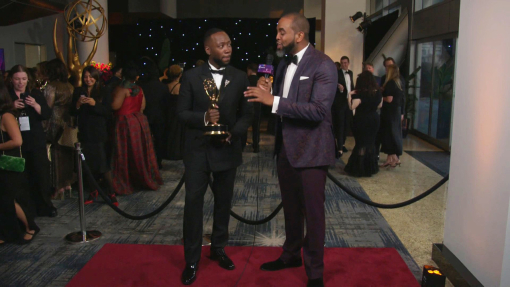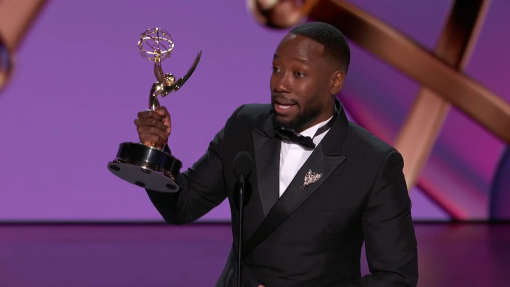Back in 2010, producer Warren Littlefield was at New York's Lincoln Center with writer-creator Noah Hawley, where their buzz-generating ABC series, My Generation, was being presented at the annual upfronts.
A one-hour docu-style drama about a tight group of high school friends in Austin who reconnect 10 years later, My Generation had been anointed by ABC’s president of entertainment, Steve McPherson, as one of his favorite new shows. The series, McPherson told the audience, was so ambitious and original, it would help fulfill ABC’s “promise to take television to a new level once again.”
For Littlefield, just being at the upfronts was a vindication. Those in the room that day knew him best not as a TV producer, but as the man who spent 20 years at NBC, working his way up from comedy development to president of the entertainment division, where he presided over the network’s Thursday night hit lineup known as “Must See TV.” But, after a series of clashes with the late Don Ohlmeyer, his boss and the president of NBC’s West Coast division, Littlefield was shown the door in 1998. Since then, he’d been seeding a transformation from network guy to creative independent producer. With My Generation, Littlefield felt something had finally clicked. Hawley had the same high hopes. “It felt like, ‘I’m back, baby,’” Hawley recalls. “I think he said that to me, literally.”
Littlefield was both right and wrong that day. He was on his way back, but not with My Generation, which was pulled after only two low-rated episodes had aired; McPherson was out at ABC and no longer around to champion it. Not much later, though, Littlefield was combing through the film titles that a post-bankruptcy MGM was hoping might be turned into a TV series, when he came across the Oscar-winning 1996 dark comedy Fargo.
Littlefield had already tried to take the Coen brothers’ grisly, snow-filled masterpiece to television once. In fact, he’d even developed a pilot in the early 2000s starring Edie Falco as Marge Gunderson, the police chief Frances McDormand played in the film. That effort never saw the light of day, but he saw that as a good thing.
“The universe had never known a failed Fargo,” says Littlefield, who reached out to Hawley, proposing that they reteam for a Fargo adaptation — with a twist. Someone had suggested to Littlefield that a long-running Fargo might work better if the funny-macabre vibe stayed but no protagonist recurred from season to season. “I said to Noah, ‘We don’t have to have Marge.’ And he said, ‘So, all new stories, all new characters and I’m still doing Fargo?’ And I go, ‘Yeah,’ and he goes, ‘Fargo — a state of mind.’ And I go, ‘Yeah!’”
Littlefield reached out to John Landgraf at FX, then still in its early days as a beacon for prestige programming. As it happens, Landgraf had been a vice-president at NBC when Littlefield was his boss’s boss. “I thought he was a deep thinker,” Littlefield says. “We had a wonderful bond.”
The next thing Littlefield and Hawley knew, they were in a meeting with a team from FX. Though they’d brought 110 pages of story outlines, the folks at FX didn’t start nitpicking; they only wanted to talk big picture. On the way out, Littlefield looked at Hawley; they had found their partner.
Fargo premiered in April 2014 to a “universal acclaim” stamp of approval from Metacritic. It later won three Emmy awards — for Outstanding Miniseries, as well as wins for directing and casting, plus 15 other nominations. Littlefield was back, but this time he framed it differently. “Fargo,” he says, “reinvented me.”
By that, Littlefield means that while he already had the contacts and the ability to pick up a phone and talk to almost anyone in the world of television, Fargo’s success confirmed his reputation for having great instincts. And it proved that he wasn’t interested in just slapping his name on a series’ end credits.
Here’s the thing about Littlefield: He likes people to know that he was boots on the ground in Calgary, where Fargo’s first three seasons and fifth season were shot, and that he froze his tail off along with the rest of the cast and crew. He wants to be involved not just in problem-solving — typically a producer’s domain — but also in helping find the right actors and riding in the van while scouting locations. He’d probably hand out breakfast burritos from the catering truck if he had the time.
“We are in it,” he says, describing how he called up Elisabeth Moss, then in New Zealand filming Jane Campion’s crime drama Top of the Lake, and convinced her to sign on to an adaptation of Margaret Atwood’s The Handmaid’s Tale for Hulu. “I just said to her, ‘I’m about to go make another Fargo. If you do it, I’ll do it. I’ll be there for you. I’ll be there at three o’clock in the morning. If we’re out in the fucking night and it’s cold and [we’re still] shooting, I’ll be there.’ And she said, ‘I think we’ll both regret it if we don’t do it.’”
After its first season, The Handmaid’s Tale brought home eight Emmy awards from 13 nominations and became the first series on a streaming service to win an Emmy for Outstanding Drama Series. In fact, Handmaid’s, now gearing up to film its sixth and final season, has won so many accolades that one day Littlefield showed up for a meeting at Hulu’s Santa Monica offices and was informed that the lobby had to be rebuilt to accommodate all the show’s trophies.
After Moss came Bridges. Together, Littlefield and showrunner-writer Jonathan E. Steinberg drove up to Santa Barbara’s Biltmore Hotel for a long lunch with Jeff Bridges and persuaded the Oscar-winning film actor to star in an adaptation of Thomas Perry’s bestselling thriller The Old Man for FX. Bridges, who’d never starred in a TV series, says he liked Littlefield’s lack of showbiz flash.
“He’s very down to earth, makes you feel comfortable,” Bridges says. But what Bridges really liked was Littlefield’s details-driven approach. “One of the main things about making movies, besides the writing, is the casting — and not just of the actors,” Bridges says. “From Warren’s point of view, it is about casting the whole team — the showrunner, everybody. Then once it’s cast, you support these artists. You respect them to do their stuff. And that’s what he is a master at. I was hooked.”
Over the years, Littlefield thought he had seen it all — crazy hirings, unexpected firings and actors on hit shows suddenly quitting. The Old Man, however, offered a unique set of catastrophes. To recap: In March of 2020, four days before the show’s producers and cast were about to leave for Morocco, where sets were already being built, Hollywood shut down due to the pandemic. Seven months later, just as production was about to restart, Bridges was diagnosed with cancer. Then, Bridges contracted a life-threatening case of Covid at his treatment center and spent five touch-and-go weeks in intensive care.
Boom, boom, boom — one thing after another. Through it all, Landgraf says, Littlefield never lost his cool. “Warren and I have something in common: One thing we do not get is flustered,” Landgraf says. The series went on to be nominated for two Emmy awards and was renewed for a second season. “Warren is rock solid, grown up, patient, a steadying influence. And even through the toughest of times, he’s very good at holding things together. That’s just the way he is. He works very, very hard and has an innate sense of where to put his focus. It’s a very unusual quality, and there’s a reason why people that possess it have found longevity in this business.”
Littlefield traces his nose-to-the-grindstone approach to his parents — a salesman dad for the H.J. Heinz company and a stay-at-home mom — and how they made sure he grew up middle-class in Montclair, New Jersey. Both of his grandmothers lived with them, and when it came to the monthly mortgage, everyone chipped in. In high school it dawned on young Warren that if he wanted pocket money, he’d have to find summer employment. One of his first jobs was the somewhat Dickensian gig of shoveling coal in a plastics factory. “I’d come home, take a shower, then a bath, then a shower,” he says. “And I’d still have stuff coming out of my pores.”
After that punishing labor, every other job was a breeze. Following high school, he made money as an untrained big-rig driver. He’d deliver frozen French fries and canned goods throughout the Tri-State area and drink beer in his off-hours with a gang of Teamsters. “I had hair down to here,” he says, gesturing mid-chest, “and a big beard. They called me Big Red.”
Inside the bushy young trucker, though, beat the heart of an arts appreciator. As a lad, he’d been allowed to stay home from elementary school to watch old movies on TV whenever he felt like it, and his mother had encouraged him to join the Montclair Dramatic Club, where he acted in several productions. He put himself through two years at American University in Washington, D.C., but ended up graduating from Hobart and William Smith Colleges in Upstate New York. He’d planned to become a psychologist, but it was while working at a small TV production company run by his former drama teacher that Littlefield — face-to-face with the elements that went into making a show — was struck by his true calling.
“They were doing location scouting and I was like, ‘I was a truck driver all through here. I’ll be part of the location team!’ Then they said, ‘We need an accountant,’ and I said, ‘I took statistics!’ They said they needed a production assistant, and I did that. Then they said, ‘Do you want to work with the editor?’ And I said, ‘This is fun, creative!’ and I got back in touch with my childhood love of TV and entertainment.”
In 1979, Littlefield became a manager in comedy development at NBC, which at the time had zero shows in the Top 25. It would be another five years before Littlefield, by then a vice-president, had his first big sitcom success, with The Cosby Show. As he rose up the ranks at NBC, he either helped develop or supervised the development of an impressive string of iconic series, including The Golden Girls, ER, Friends, Cheers, Seinfeld and Will & Grace. Even his final battle with his boss, Don Ohlmeyer — an argument that got him fired — bore out his prescience when it came to ratings toppers.
In a phone call, Ohlmeyer told Littlefield that he wanted to pull the plug on a political drama Littlefield had been gestating with Aaron Sorkin called The West Wing. “‘I’m in this job because I get to say, Let’s make it. You do what you do, but I get to make these calls. Otherwise, I don’t know why I’m here,’” Littlefield remembers telling his boss. “And [Don] was like, ‘You know what? I don’t think you should be here.’ So, I left them with the deal in place for the show and the script, and I was out.”
According to Noah Hawley, what makes Littlefield an invaluable partner is that he’s retained all the things he learned at NBC, including fluency in the language of The Suits. “It’s like, ‘What does the network mean when they say this?’ He understands that,” Hawley says. “He understands the ratings side of it, the money side of it. And Warren and I both understand that what we’re doing is creative problem- solving and that the answer is rarely to yell. But if the answer is to yell, then that’s a strategic choice. And he’s a sophisticated strategist. And the question is, ‘Who should yell?’ Because if Warren yells, it means something different than if I yell. He’s such a level-headed guy who really understands the playing field. And he always tries to protect the creatives.”
Over the years, Littlefield’s methods haven’t changed much. For example, when Beth Macy’s book Dopesick: Dealers, Doctors, and the Drug Company That Addicted America was still in manuscript form, he went into full-on Warren mode, winning over Macy by going deep. “I was so overprepared,” he says. “I quoted her sections in the book. We didn’t even have a writer yet, but she was like, ‘I think you’ll get this made.’” In 2021, Dopesick ran as an eight-episode limited series on Hulu, going on to earn 14 Emmy nominations and two wins, as well as a Peabody.
These days, he’s working with John Ridley (American Crime) on developing another Thomas Perry novel, Murder Book. And he’ll be in Italy this summer, executive producing a limited series based on the true story of Amanda Knox and her incarceration in Umbria after being wrongfully convicted for the murder of British student Meredith Kercher. It will be executive produced, in part, by Monica Lewinsky and Knox herself, both of whom Littlefield describes as “strong, compassionate and intelligent” and who “know what it’s like to be used as raw meat by the media.”
When Littlefield talks about the future, it’s with palpable energy. But he also has a way of downplaying how well it’s going. “We just try and find things that speak to us and we think will resonate with the world,” he says, as if it’s that easy. Maybe that’s because when he’s asked to remember what things felt like before, he doesn’t pretend that the time between his winning streak at NBC and the uninterrupted victories he’s experiencing now was just some holding pattern, with an inevitable return to greatness in the cards.
“There was a real drought,” he says. “But I think I carried forward that work ethic I had.” John Landgraf, however, felt like Littlefield’s return was more inevitable than that.
“The best producers, they fill a space with their passion, their desire and their willingness to tackle tough challenges,” Landgraf says. “I think Warren brought in great [partners], but he is also a person that just has everything you need. All that potential was sitting there — he just needed the right material and a place that wouldn’t suppress what he has to offer.”
This article originally appeared in emmy magazine issue #2, 2024, under the title "Winning Time."











